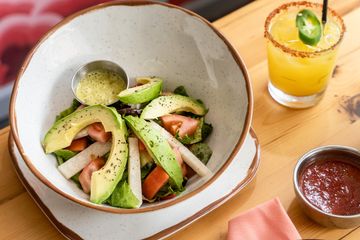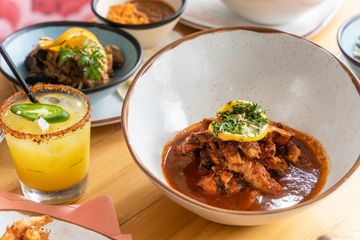Is Mexican Food Healthy? Unpacking the Nutritional Conveniences of Conventional Ingredients
The question of whether Mexican food is healthy and balanced welcomes an expedition of its traditional components. Beans and corn work as foundational staples, abundant in healthy protein and fiber. Avocados supply useful fats, while numerous herbs and seasonings include taste and wellness benefits - tacos. With each other, these elements produce a tapestry of nutrition. The healthfulness of Mexican cuisine frequently depends on prep work approaches and part sizes. What duty do these variables play in identifying its general nutritional value?
The Power of Beans: Protein and Fiber-Rich Staples
Although typically forgotten, beans serve as a foundation of Mexican cuisine, using a riches of nutritional benefits. Rich in protein, they are an exceptional plant-based option for those seeking to satisfy their nutritional healthy protein needs. This high healthy protein material sustains muscular tissue fixing and growth, making beans important for both vegetarians and meat-eaters alike. Additionally, beans are an extraordinary source of nutritional fiber, which helps in digestion and advertises a feeling of fullness, potentially assisting with weight management.
The variety of beans utilized in Mexican dishes, such as black beans, pinto beans, and kidney beans, adds to a varied flavor account and can improve meals nutritionally. Additionally, beans are low in fat and contain crucial vitamins and minerals, including folate, magnesium, and iron. Together, these features make beans an important ingredient, delivering both sustenance and food in conventional Mexican fare.

Corn: a Versatile Grain With Nutritional Conveniences
Corn sticks out as a functional grain basic to Mexican food, commemorated not only for its culinary applications yet additionally for its excellent nutritional profile. As a primary ingredient in dishes like tortillas, tamales, and pozole, corn provides essential nutrients that add to a balanced diet plan. Rich in carbs, it functions as a considerable power resource, while additionally being low in fat, making it a positive alternative for numerous dietary requirements.
Moreover, corn is a great source of nutritional fiber, which assists in digestion and advertises satiety. It contains substantial quantities of vitamins such as B-complex vitamins, which are necessary for basal metabolism. The presence of anti-oxidants, specifically carotenoids, contributes to overall health and wellness by reducing oxidative stress and anxiety. Additionally, corn is gluten-free, dealing with those with gluten level of sensitivities. Generally, the dietary advantages of corn emphasize its relevance in conventional Mexican food and its function in a healthy and balanced diet regimen.
Avocados: Healthy Fats and Nutrients in Every Bite
Avocados play a considerable duty in Mexican cuisine, complementing dishes with their luscious appearance and abundant taste. Beyond their cooking allure, avocados are celebrated for their impressive dietary account. They are an abundant source of healthy and balanced monounsaturated fats, which can help lower poor cholesterol levels and support heart health. Additionally, avocados are packed with essential nutrients, consisting of potassium, vitamin E, and B vitamins, adding to total wellness.
The high fiber content in avocados help digestion and promotes satiation, making them a helpful enhancement to any kind of meal. Their unique nutrient composition can also support skin health and supply anti-inflammatory benefits. Including avocados into typical Mexican meals or appreciating them as a standalone treat can boost both flavor and nutrition, demonstrating why they are a cherished staple in Mexican food. On the whole, avocados supply a scrumptious way to enjoy healthy fats and important nutrients in every bite.

Seasonings and Herbs: Flavorful Wellness Boosters
While delighting in the abundant flavors of Mexican cuisine, one can not forget the essential function that spices and natural herbs play in enhancing both preference and health. Components such as oregano, cilantro, and chili peppers not only add to the vibrant taste profile yet additionally give considerable health benefits. Cilantro is known for its detoxing residential properties, aiding to get rid of hefty metals from the body, while oregano is loaded with anti-oxidants and possesses anti-inflammatory impacts.
Chili peppers, a staple in lots of why not find out more Mexican dishes, have capsaicin, which has actually been linked to improved metabolic process and pain relief. Additionally, seasonings like cumin and coriander support food digestion and may assist in blood sugar policy. Incorporating these delicious health and wellness boosters into meals not only enhances the cooking experience however also promotes general health, making Mexican food not simply tasty, but also nutritionally advantageous.
Conventional Cooking Techniques: Enhancing Nutrition and Flavor
Conventional cooking methods in Mexican food play a necessary role in enhancing both nourishment and flavor, as they commonly prioritize fresh ingredients and time-honored strategies. Techniques such as nixtamalization, where corn is saturated and cooked in an alkaline solution, not only improve the nutrient account of tortillas but additionally boost their digestibility - take out and delivery. Furthermore, making use of slow food preparation approaches, like cooking or braising, permits tastes to blend wonderfully while retaining the honesty of the components

Regularly Asked Concerns
Are Mexican Food Portions Usually Larger Than Various Other Cuisines?
Mexican food portions are usually bigger than those of many various other cuisines. This particular reflects typical eating techniques, stressing common sharing and hearty meals, which can bring about a more significant serving dimension on the whole.
Exactly how Does the Preparation Approach Affect Healthfulness of Mexican Food?
Prep work approaches greatly affect the healthiness of Mexican food. Methods such as barbecuing or steaming preserve nutrients, while frying can raise harmful fat web content. Selections of components and cooking designs eventually identify general dietary worth.
Can Mexican Food Be Tailored for Specific Dietary Constraints?
Mexican food can undoubtedly be tailored for particular nutritional restrictions. Alternatives, such as using corn tortillas for gluten-free diets or including more veggies, enable people to appreciate traditional tastes while accommodating numerous nutritional demands.
What Prevail False Impressions Concerning Mexican Food and Wellness?
Typical misconceptions concerning Mexican food consist of the belief that it is naturally undesirable, extremely zesty, and exclusively concentrated on fats. In fact, standard meals typically feature nourishing active ingredients and can be tailored to various dietary demands.
Are There Much Healthier Options at Mexican Restaurants?
Healthier alternatives at Mexican restaurants commonly include grilled meats, beans, and fresh veggies. Selecting meals that stress entire components and preventing hefty sauces can bring about a much more nourishing dining experience, promoting general health.
The variety of beans utilized in Mexican recipes, Resources such as black beans, pinto beans, and kidney beans, adds to a diverse taste account and can enhance meals nutritionally. Avocados play a significant duty in Mexican food, enhancing recipes with their creamy structure and rich taste. Incorporating avocados right into conventional Mexican recipes or enjoying them as a standalone snack can improve both taste and nutrition, demonstrating why they are a cherished staple in Mexican cuisine. While appreciating the rich flavors of Mexican food, one can not neglect the vital role that spices and natural herbs play &pizza in improving both taste and health. Traditional food preparation approaches in Mexican food play an essential function in boosting both nutrition and taste, as they usually focus on fresh components and classic methods.